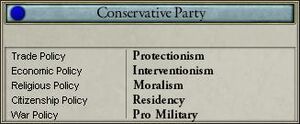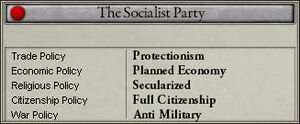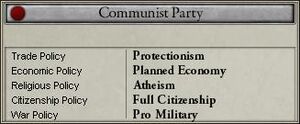意识形态和政党是《维多利亚2》传达各种政治观点的主要工具——维多利亚时代和进步时代政治思想和行动模式的转变。执政党和民众的意识形态对玩家行动的广度有着很大的影响,决定了这个国家可以进行什么样的政治改革和社会改革,以及目前支持哪些政见。
意识形态类型
《维多利亚2》中有七种政治意识形态,每一种都是通过所有可玩国家的数百个独立政党表达出来的。这些意识形态代表了更广泛的政治运动的核心,因此,玩家可以看到在具有相似甚至相同名义意识形态的政党之间存在不小程度的差异。事实上,每个国家独特的具体情况会影响各方的立场。尽管如此,对这些政党背后的意识形态源头有一个粗略的了解,对于玩家来说是很有用的。
 Conservative
Conservative
Conservatives value order as a social end. Conservatives are the old guard, the arbiters of the status quo, the defenders of tradition and enemies of change. Conservative parties in the Victorian era were markedly different from today's conception of conservative (at least the Anglo-American conception). Conservatives upheld tradition above all else, being reluctant to enact any reform that would threaten the old ways. This means different things for different societies. In an absolute monarchy, the conservatives are likely more "conservative", defending the crown and its values, likely leaning towards moralism, jingoism, residency, state capitalism, and protectionism. In a more liberal nation like Britain or America, conservatives may simply be defending the way things have always been, or perhaps defending the historic role of the state against new liberal ideas of freedom. Expect these parties to sometimes uphold more liberal principles such as free trade, limited citizenship, pluralism, and even laissez faire.
This is ideology most prevalent in the world at the start of the game. Most of the poor strata are conservative-oriented at first, though this usually changes with time. Aristocrats and officers are reliably conservative or reactionary, the more radical cousin of conservatives, detailed below. Other pops may be conservative depending upon their situations, but generally a pop is more conservative when its consciousness is kept low. Conservative is useful because its moderate statism allows a player to exercise some level of control over his country without most of the worst penalties.
保守主义意识形态在游戏开始时就已存在。
典型政见
- 保护主义: 保守党倾向于保护主义,尽管这并非铁则,而且有许多保守党主张自由贸易。
- 干涉主义: 干涉主义在保守党中最为常见,尽管也有少数主张自由放任或国家资本主义。
- 道德主义: 保守党向来倡导道德主义,当然,有些主张多元主义。
- 居留权: 居留权是保守党的基本观点,偶尔有主张有限公民权者。
- 扩军主义: 到目前为止,扩军主义是保守党中最常见的立场,不过也有人主张沙文主义。裁军主义的保守党可能存在,但很少。
Political Reform Stance
- Conservatives are generally against any political reforms, but can be persuaded to enact reforms as a stop-gap measure when militancy is high. If militancy is low, very few conservatives will support reform.
Each point of militancy, or each 10% of reform movement strength, makes 10% of the conservatives in the upper house willing to back reforms.
Social Reform Stance
- Conservatives are swayed to social reform only with great reluctance. As with political reform, militancy and reform movement strength makes conservatives support reforms.
 反动主义
反动主义
The more extreme cousin to the conservative party, the reactionaries do not stop at the defense of currently upheld tradition, but demand a return to the old ways. In Europe, reactionaries are most often monarchists that uphold the all-powerful state of the absolute monarchy as ideal. In the Americas their positions vary from nativists to monarchists and more. Often non-Western reactionaries are a reaction against Western influences or power within or around the nation in question, for example the Boxers in China.
Reactionaries are likely to be found among aristocrats and officers, but also among the broader population. In a way, reactionary is one of the best parties to play. They are available from the start. If the party is state capitalist, it allows the player a great deal of power over his economic destiny, while jingoism allows players to expand aggressively and protectionism allows high tariffs to fund these projects.
The reactionary ideology exists from the beginning of the game.
Typical Party Issues
- Protectionism: Reactionaries are almost universally protectionists.
- State Capitalism: State capitalism is the most common among reactionary parties, though interventionism is also common. Planned is occasionally seen.
- Moralism: Reactionaries almost never stand for anything less than moralism, as national religious values are often central to their ideals.
- Residency: Residency is the primary reactionary stance, limiting voice in government only to primary culture.
- Jingoism: Jingoism is pretty standard for reactionaries, demanding a minimum level of defense spending. Pro-Military is also conceivable.
Political Reform Stance
- Unlike their compromising brethren in the conservative wing, reactionaries will never, under any circumstance, support political reform. To the contrary, reactionaries will always support the repeal of political reforms, pushing the country back towards a more state-centered, anti-liberal position.
Social Reform Stance
- As with political reforms, social reforms are anathema to reactionaries, and their support is never given to such movements. If given the chance, reactionaries will always support the reduction of social reforms.
自由主义
Liberals favor liberty as the most valued social end. The liberal movement of the 19th century was an extremely important one. The liberals of America and Europe opened up these nations to trade, capitalism, and responsible government. Liberals were a diverse bunch, supporting a wide array of ideas and often conflicting with one another. Universal among them was some vague notion of expanding liberty, in a specific area or broadly. Liberals were often the forward-thinkers, the people who opposed the old state-dominated order and sought to unleash human potential by throwing off the chains the bound people down. Liberals were the cornerstones of the abolitionist movement, the Corn Law repeals in England, the end of the Second National Bank in America, and many more projects aimed at reducing government power over peoples' interactions with one another.
Liberals are often found among capitalists and clerks, and sometime clergy or artisans. Other pops can of course also be liberal, but this is circumstantial. Liberal parties can be difficult to play in Victoria 2, as they often severely limit player options in a variety of fields. This is counterbalanced by reductions in factory costs and a few other perks, but the advantages often seem to be outweighed by the disadvantages. Most players will probably avoid liberal parties because they basically remove economic management as a game component. This can be useful to new players though, or to experienced players who enjoy the idea of a liberal nation and want a bit of challenge.
The liberal ideology exists from the beginning of the game.
典型政见
- 自由贸易: Free trade was one of the first major liberal issues, and most liberal parties are free traders. Some liberal parties still favor protectionism, notably the Republicans in America.
- 自由放任: Liberals uphold freedom above all else, so central economic management is usually shunned. Some liberal parties may mildly advocate interventionism, but nothing further.
- 多元主义: Liberal parties are often in favor of religious pluralism, but are almost as often in favor of secularism. Moralism and atheism are not unheard of, but less common, as liberals generally advocate little to no government role in religion.
- 完整公民权: Liberals tend to advocate full rights for immigrants and minorities on the basis of natural rights, but some liberal parties diverge from this standard and support only limited citizenship or even residency.
- 扩军主义: The liberal parties vary wildly on the issue of military power. Some liberal parties go so far as to advocate jingoism, while others are pacifistic. Expect moderate pro-military or anti-military stances.
政治改革立场
- Liberals unfailingly support political reform, and under no circumstance will they support a roll-back of political reforms. Representative and transparent government was one of the linchpins of 19th century liberalism.
社会改革立场
- Liberals will only reluctantly support social reforms, usually in cases where militancy has soared. In the game, once reforms are in place, they do not support their repeal (though this is of debatable historical accuracy).
 无政府自由主义
无政府自由主义
无政府自由主义者是自由主义者更激进的表亲,他们把人类自由的思想推向了逻辑的极端。虽然自由主义者倾向于改革者,通常是知识分子或权力人物,他们试图纠正不自由秩序的不合理之处,但无政府自由主义者则完全是另一回事。无政府自由主义者主张国家作为一个实体的终结和所有人的自由平等的存在,可以预期将会毫不动摇地支持最自由的立场。
无政府自由主义者在游戏的早期,1848年,就已经出现了,这一年是欧洲发生严重政治动荡的一年。无政府自由主义者面临着许多与自由主义者相同的问题和优势,但由于他们对自由主义立场的一贯支持,这些问题也始终存在。
典型政见
- 自由贸易:无政府自由主义者几乎普遍支持自由贸易,这严重限制了玩家对进口商品征税的能力。
- 自由放任:无政府自由主义者最显著的特征是他们支持自由主义,所以不要期望在无政府自由党中看到除此之外的立场。尽管如此,一些无政府主义自由党却打破了常规,支持干涉主义,甚至(非常罕见)支持国家资本主义。
- 世俗化:无政府自由主义者会支持各种宗教立场,但通常赞成世俗主义。多元主义和无神论也很普遍,而道德主义则几乎闻所未闻。
- 完整公民权:无政府自由主义者在支持完整公民权方面非常一致,但有的政党也可能支持有限公民权。
- 扩军主义:无政府自由主义者在军事问题上分歧最大。一些无政府自由主义政党甚至支持沙文主义,而另一些则支持和平主义。像他们的自由党同胞一样,没有硬性规定,但扩军主义似乎是最常见的。
政治改革立场
- 无政府自由主义者永远不会支持颁布或废除政治改革。这似乎是合乎逻辑的,因为无政府自由主义者不想通过支持改革的倒退而使国家恶化,但也不想通过使国家如他们所想的一样“自由”来使国家本身合理化。因此,不作为是他们选择的道路。
社会改革立场
- 无政府自由主义者永远不会支持社会改革,相反会永远支持废除社会改革。虽然政治改革的问题对许多无政府自由主义者来说是个麻烦,但不论当时还是现在,社会福利国家普遍受到无政府自由主义者的憎恨。因此,无政府自由主义者在社会改革问题上会很奇怪地与反动主义者保持一致。这一立场是所有意识形态中最不历史的,因为在整个历史上,特别是在19世纪,绝大多数流行的无政府主义形式也是社会主义或其他形式的左派。
 Socialist
Socialist
Socialists believe equality is the paramount value a society must pursue. Socialists seek to use the machinery of the state to take from those that have and give to those that have not. Socialists are available mid-game, around 1860, but often a party will not be available for some time after this date.
Expect socialism to be most prevalent among poor-strata pops, particularly craftsmen and laborers. Socialism is a very powerful force late in the game, and will spread among all populations. Socialism can be a mixed bag for the player. Though it allows a broad degree of economic control, socialist parties often restrict player power over tariff and military policy. The most useful aspect of socialist parties to the player is likely their broad popularity late game, and their ability to implement useful social reforms.
Typical Party Issues
- Free Trade: Socialists broadly support free trade, though they may support protectionism instead.
- Planned Economy: Socialists espouse state-run economic systems and central planning. Anything less than support for planned economy is rare, but state capitalism is possible.
- Secularism: Socialists believe religion to be a private matter, and that the state has no place in religious life. Thus they are overwhelmingly in favor of secularized religious policy, though atheism is upheld by some parties.
- Full Citizenship: Socialists support full citizenship on the basis of humanism, that all people are equal. This policy is widespread among socialist parties and unlikely to be compromised.
- Anti Military: Socialists are usually anti-military, opposing war as a tool of the bourgeois elite to force the universal working class to oppress itself. Pacifism is also possible, and even pro military, but jingoism is out of the question for most parties.
Political Reform Stance
- Socialists will support political reform only when militancy or reform movement power is high, but they never support political reform repeal. This lack of support is perhaps odd due to historically widespread endorsement of political reforms such as universal suffrage by such socialists as Karl Marx (among other reasons these political reforms enfranchised the socialists' voters). However it is likely that the game designers simply wished to make the ideologies more unique rather than completely factually accurate.
Social Reform Stance
- Socialists always support increased social reforms, and will never support their repeal. This is one of the central tenets of the socialist parties, and one of the more useful qualities of the ideology to the player.
 共产主义
共产主义
共产主义者是社会主义者中的激进派。共产主义者并不寻求对现有结构进行和平改革,因为他们认为在资本主义制度下建立的制度,例如代议制民主政体,本身就存在缺陷。共产主义者寻求革命(在必要时,从反革命暴力手中捍卫革命)以及对当前有缺陷的社会秩序的剧变。国家作为一个阶级压迫另一个阶级的有力工具,要被无产阶级转为彻底消灭腐朽的资本主义霸主阶级。
共产主义者和社会主义者存在于相似的人群中,这些人群属于工业化社会的下层阶级。中间阶级也可能有共产主义的同情者,但这样的人在富裕阶级中很罕见。共产主义者在游戏中期就可以出现,但通常是一个小的边缘群体,在游戏后期才有政党出现。共产主义比社会主义对玩家更友好,坚持更为一致的理想,并在任何意识形态中提供最广泛的控制范围。另外,如果他们成功地将国家变为共产主义,这个国家的国旗将会被更换,新国旗通常包含锤子和镰刀。
典型政见
- 保护主义:和那些过去曾经是自由派的社会主义者不同,共产主义者认为经济发展不平衡是罪恶的根源,几乎所有人都反对它,赞成自给自足。
- 计划经济:共产主义者是计划经济的强硬支持者。中央计划实现了他们意识形态的最高原则,所以别指望其它。
- 无神论:共产主义者一般相信马克思的理论,即宗教是对群众的压迫(“精神鸦片”),因此它是人民自我实现的障碍。世俗化是可能的,但很少见。
- 完整公民权:共产主义者承认阶级斗争的存在,认为各民族、各人种的工人同样受到腐朽资本家的压迫。因此,完整公民权是一种常态。
- 扩军主义:共产主义者通常支持扩军主义。这并不难理解,因为他们经常是资本主义世界政变和侵略的对象。沙文主义也是共产主义者的一个典型,因为用武力传播世界革命是共产党人的共同目标。然而,共产党人有时也可能支持裁军主义,甚至是和平主义。
政治改革立场
- 与他们的社会主义/社会民主主义兄弟不同,共产主义者反对自由主义者的民主政府理念。他们认为,一个最有阶级意识的人组成的强大的先锋队,可以像管弦乐队指挥的温和领导一样,高效地管理社会;如果缺乏理想的纪律和阶级意识,权利就应当受到限制。因此,他们在必要时支持废除政治改革,决不支持淡化无产阶级的统一意志。
社会改革立场
- 共产党人把国家看作是一个能使所有人都平等,并提供共同利益的工具。因此,他们总是赞成扩大国家福利,在这个问题上决不让步。
 法西斯主义
法西斯主义
法西斯是一个奇怪的品种。由于第一次世界大战后的不满和文明崩溃,法西斯主义很快获得了广泛的追随者。法西斯主义吸引了社会各界的追随者,这些支持大多来自中产阶级(尤其是中产阶级下层)和农村。法西斯主义者通过国家建设的民族共同体来支持民族复兴。法西斯政权经常组织森严而且手段残酷。他们在欧洲的崛起是两次世界大战期间人民的一个主要特征,也是引发第二次世界大战的一个重要因素。
法西斯主义者几乎在任何人群中都能得到广泛的支持。但是他们只在游戏的最后阶段才会出现,而他们的政党通常只在最后十年左右才会出现。法西斯主义是最具多样性的意识形态之一。它允许任何意识形态的玩家采取广泛的行动,特别是在法西斯政党掌权的情况下。法西斯主义允许玩家几乎完全控制经济,但仍然允许资本家插手。法西斯主义者的军事和贸易立场允许玩家在很大程度上控制政策,并且在他们掌权时可以实施各种改革。法西斯政权还有一些很帅的旗帜。
法西斯主义者的信仰狂热且不妥协,因此,与其他意识形态不同,政党之间的政策从来没有任何偏差。法西斯分子永远支持下面的政见。
典型政见
- 保护主义:法西斯主义者最关心的是国家,或者说“人民”的健康,因此限制了国外市场和“低等民族”的商品。
- 国家资本主义:尽管法西斯主义者倾向于反资本主义,但企业主愿意为国家注入资金,使之安全繁荣。
- 道德主义:法西斯主义者惧怕损害国家统一,因此他们只信仰一种宗教,其他宗教都不被容忍,即使是基督教和伊斯兰教的不同分支也不能共存。
- 居留权:法西斯主义者会把居住在自己祖国的外国人视为对政治的亵渎,更不用说给他们投票权和其他福利了。
- 沙文主义:法西斯主义者总是奉行扩张主义政策。这通常是为了收复失地,或是夺取弱国的土地。
政治改革立场
- 法西斯主义者很独特,因为他们是唯一一个既支持实施又支持废除政治改革的政党。法西斯在上议院的这种态度取决于法西斯政党是否执政。如果是,他们会同时支持实施政治改革和废除政治改革,但如果他们是反对党,他们将坚决抵制一切变革。
社会改革立场
- 正如他们对政治改革的立场一样,如果法西斯党是执政党,他们同时支持实施社会改革和废除社会改革。这可能看起来很奇怪,但在历史背景下是可以理解的。法西斯主义者强烈反对共产主义,如果他们在一个共产主义国家夺取了控制权,他们很可能会取消改革。然而,法西斯主义者也支持对国家采取公有化的做法,强调他们的民族或种族中每个成员的兄弟情谊。这会带来广泛的国家福利项目。因此,任何一种选项都是法西斯掌权者的选择。
Miscellaneous
Data on ideologies can be accessed by locating the Paradox folder in the drive to which it is saved, the navigating to Victoria 2/common/ideologies.txt.






